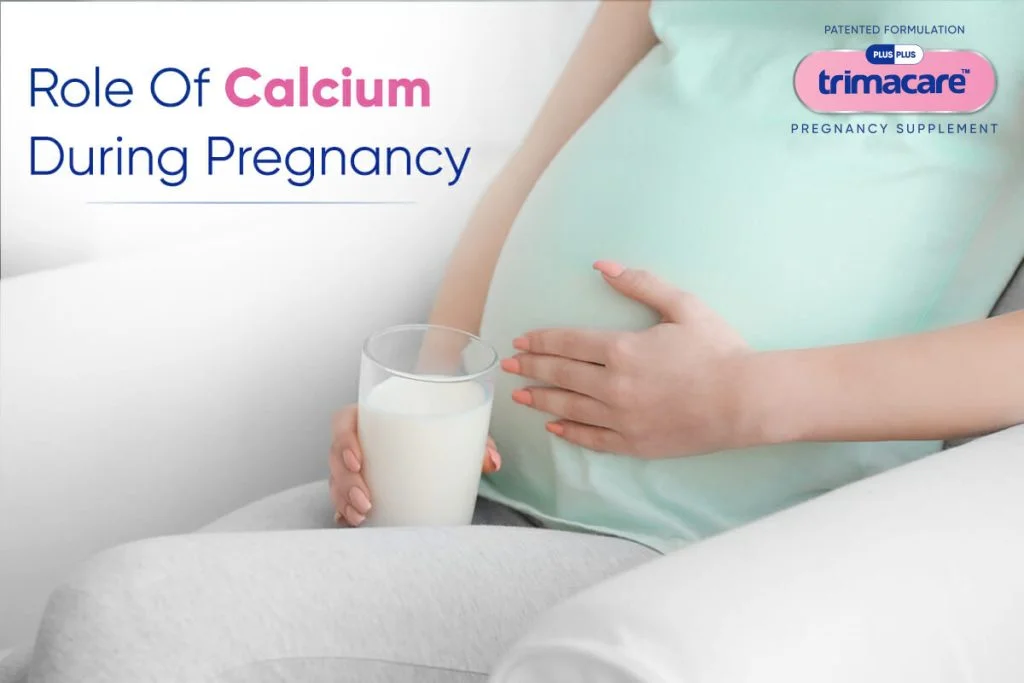Pregnancy is a life-changing journey, and every choice you make—especially when it comes to nutrition—has a big impact on your baby’s health and your own well-being. One nutrient that often gets overlooked but is absolutely vital is calcium.
While we usually associate calcium with strong bones, its role during pregnancy goes far beyond that. If you’re an expecting mom in India, this guide is for you. Let’s talk about why calcium is so important during pregnancy, how much you need, the best Indian foods to get it from, and whether a supplement like Trimacare™ can help fill any nutritional gaps.
Why Calcium Matters During Pregnancy
Think of calcium as a silent helper—it’s working behind the scenes to:
- Build your baby’s bones and teeth
Your baby’s skeleton starts forming as early as the first trimester, but rapid bone growth kicks in during the second and third. Calcium plays a starring role here. - Protect your own bones
If you’re not getting enough calcium through food or supplements, your body will take it from your bones to support your baby—putting your bone health at risk. - Prevent complications
Studies show that getting enough calcium may help lower the risk of pregnancy-related conditions like pre-eclampsia and high blood pressure. - Support other body functions
Calcium also helps your muscles move, your nerves send messages, and your blood clot the way it should. Important stuff, right?
How Much Calcium Do You Really Need?
According to the Indian Council of Medical Research (ICMR), pregnant women need about 1200 mg of calcium per day.
That might sound like a lot—but remember, your baby is literally building bones inside you! And since many Indian women already fall short on daily calcium intake (especially vegetarians), pregnancy increases the need even more.
Tip: Your calcium needs increase during the second and third trimesters, so pay special attention as your pregnancy progresses.
Top Indian Foods Rich in Calcium
Here’s some good news: Indian kitchens are full of calcium-rich ingredients! You just need to know where to look:
Dairy Delights
- Milk
- Curd (dahi)
- Paneer
- Cheese
Plant-Based Sources
- Ragi (Finger Millet) – A super grain loaded with calcium
- Til (Sesame Seeds) – Especially in til laddoos or chutneys
- Green leafy vegetables – Like spinach (palak), fenugreek (methi), and amaranth (chaulai)
- Almonds and dried figs
- Tofu and soybeans
- Calcium-fortified foods – Some breakfast cereals and plant-based milks
Also, don’t forget Vitamin D—it helps your body absorb calcium better. So soak in some morning sunlight whenever you can!
How to Know If You’re Not Getting Enough Calcium
If your calcium levels are low during pregnancy, your body will give you subtle (and not-so-subtle) signals:
- Muscle cramps or spasms (especially at night)
- Weak nails, brittle teeth
- Feeling tired or irritable
- Tingling in your fingers or toes
- In more serious cases, it may affect your baby’s bone development or your postnatal recovery
If you notice these signs, talk to your doctor right away.
How Trimacare™ Can Help
Sometimes, no matter how well you eat, it’s hard to meet all your calcium needs through food alone. This is where a prenatal supplement like Trimacare™ can help:
- It’s designed specially for Indian women, keeping in mind common nutrient gaps in our diets
- Contains the right amount of calcium + Vitamin D3 to support better absorption
- Comes in trimester-specific formulas, so your calcium needs are supported at every stage
- Easy to take alongside a balanced Indian meal plan
Whether you’re vegetarian, lactose-intolerant, or just have pregnancy food aversions, Trimacare™ gives you peace of mind that you’re covering all bases.
When and How to Take Calcium Tablets
A little timing can make a big difference:
- Take calcium after a meal (it’s better absorbed this way)
- Avoid taking calcium and iron at the same time—they can block each other’s absorption
- A good rule: Iron in the morning, calcium in the evening
- Always follow your doctor’s dosage recommendation
Frequently Asked Questions
Q1. Can I take calcium every day during pregnancy?
Yes, daily calcium intake is safe and recommended, as long as it’s within the advised limit.
Q2. Is too much calcium harmful?
Overdoing it can lead to issues like kidney stones. Stick to the recommended dose, and check with your doctor.
Q3. What if I don’t take enough calcium?
Your body may pull calcium from your bones, and your baby may not get enough for proper development.
Q4. Can I get enough calcium from food alone?
Possibly—but only if your diet is rich and balanced. Many Indian women need a supplement, especially vegetarians.
Q5. Is calcium needed throughout pregnancy?
Yes, but your needs increase in the later stages—so don’t skip it in the second and third trimesters.
Final Thoughts
Pregnancy is a special chapter—and you want to do everything right for your baby. Calcium may not be the flashiest nutrient, but it’s absolutely essential for both your health and your baby’s development.
With the right mix of Indian calcium-rich foods, daily sunlight, and a trusted supplement like Trimacare™, you can rest easy knowing your baby’s bones (and yours!) are in good hands.
A Certified Nutritionist with a rich healthcare background in health journalism, the author has immense experience in curating reader-friendly, engaging, and informative healthcare blogs to empower readers to make informed pregnancy-related decisions.












